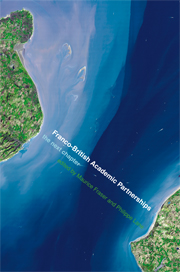Book contents
- Frontmatter
- Contents
- Notes on Contributors
- Foreword by His Excellency Bernard Emié
- Foreword by Sir Peter Westmacott
- Preface
- Part I Teaching and Training Partnerships
- 1 Why is the United Kingdom Important to Sciences Po?
- 2 Franco-Welsh Academic Partnerships: A Case Study Involving Transnational and Cross-sector Mobility
- 3 Double Diplomas: A Franco-British Training Route of Excellence for Teachers of French Worldwide?
- 4 The Entente Cordiale: A Grande École Engineering School Perspective
- 5 Links Between British Universities and French Instituts Universitaires de Technologie: New Forms of Collaboration
- 6 One Model: The Franco-German University
- 7 Raising Students' International Profile: How Do Universities Address This Issue in Europe?
- 8 Franco-British Academic Partnerships at the University of Provence
- 9 University College London and France: Teaching and Research Collaborations
- 10 Université Paris 1 Panthéon-Sorbonne: An Overview of More Than 30 Years of Franco-British Partnerships
- 11 Towards a Vision for a Networked European Business School
- Part II Research Partnerships
- Part III Broader Perspectives
- Appendices: Addresses and Speeches at the Franco-British Academic Partnerships Seminar, French Institute, London, 5 February 2010
- Index
1 - Why is the United Kingdom Important to Sciences Po?
from Part I - Teaching and Training Partnerships
- Frontmatter
- Contents
- Notes on Contributors
- Foreword by His Excellency Bernard Emié
- Foreword by Sir Peter Westmacott
- Preface
- Part I Teaching and Training Partnerships
- 1 Why is the United Kingdom Important to Sciences Po?
- 2 Franco-Welsh Academic Partnerships: A Case Study Involving Transnational and Cross-sector Mobility
- 3 Double Diplomas: A Franco-British Training Route of Excellence for Teachers of French Worldwide?
- 4 The Entente Cordiale: A Grande École Engineering School Perspective
- 5 Links Between British Universities and French Instituts Universitaires de Technologie: New Forms of Collaboration
- 6 One Model: The Franco-German University
- 7 Raising Students' International Profile: How Do Universities Address This Issue in Europe?
- 8 Franco-British Academic Partnerships at the University of Provence
- 9 University College London and France: Teaching and Research Collaborations
- 10 Université Paris 1 Panthéon-Sorbonne: An Overview of More Than 30 Years of Franco-British Partnerships
- 11 Towards a Vision for a Networked European Business School
- Part II Research Partnerships
- Part III Broader Perspectives
- Appendices: Addresses and Speeches at the Franco-British Academic Partnerships Seminar, French Institute, London, 5 February 2010
- Index
Summary
Introduction
If one were to describe the main trends of the last decade in higher education across the world, ‘internationalisation’ would most likely be one the first words to come to mind. Over the last 10 years universities have devoted significant human and financial resources to the ‘globalisation’ of their institutions. As a result, one would be hard pressed to find a major university today that has not set out an international strategy for itself, though the content, breadth and implementation of these strategies vary widely from one institution to another, as do the resources that are invested in them. However varied the implementation of strategy, though, the rationale for internationalisation is similar for all institutions.
The first incentive is that of attracting the best students and the best staff worldwide. With students increasingly seeking to study in a country other than their own, universities are in fierce competition for the best of them. According to the Organisation for Economic Co-operation and Development (OECD), in 2000 there were 1.6 million students in OECD countries who were not studying in their country of origin. In 2007 that number had risen to 2.5 million, an increase of 56 per cent in only seven years. Similarly, though no equally reliable statistics are available, the academic job market is increasingly international and top-ranking universities all boast a multinational research community.
- Type
- Chapter
- Information
- Franco-British Academic PartnershipsThe Next Chapter, pp. 3 - 13Publisher: Liverpool University PressPrint publication year: 2011



